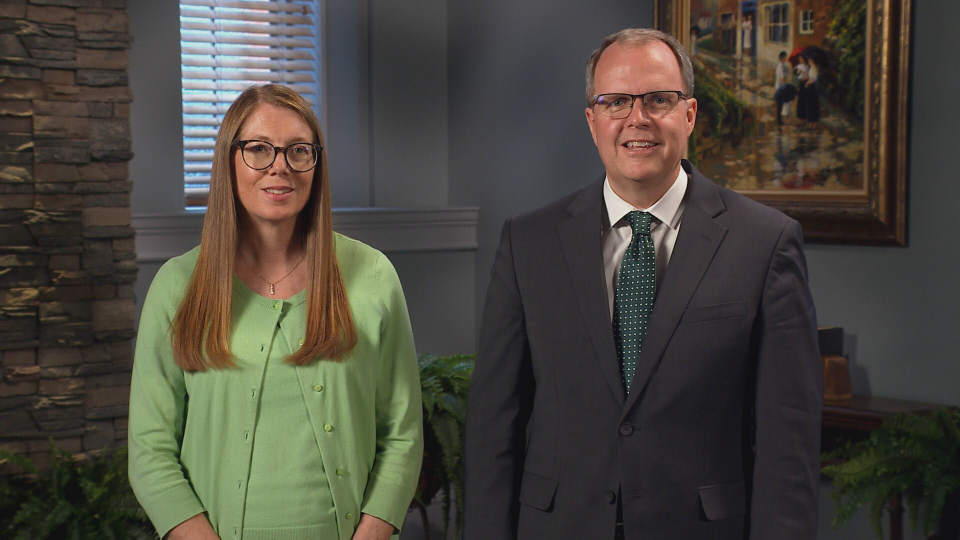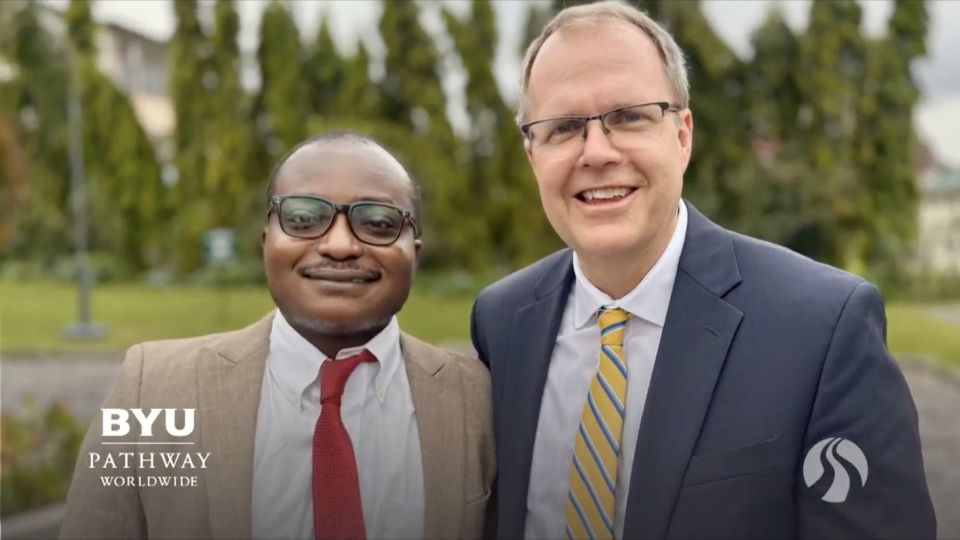
Ashtons
BYU–Pathway Worldwide President Brian K. Ashton and his wife, Sister Melinda Ashton, speak during a devotional broadcast on Tuesday, January 16, 2024. Screenshot from byupathway.org, courtesy of Church News. All rights reserved.This story appears here courtesy of TheChurchNews.com. It is not for use by other media.
By Rachel Sterzer Gibson, Church News
In his general conference address last October, President Russell M. Nelson encouraged the worldwide Church to “think celestial.”
During a devotional broadcast on Tuesday, January 16, BYU–Pathway Worldwide President Brian K. Ashton and his wife, Sister Melinda Ashton, reiterated the Prophet’s invitation and encouraged students to apply it to education.
“With respect to education, when we think celestial, we choose to always be learning, and we get as much education as we can,” President Ashton said.
Sister Ashton began their joint address on Tuesday by explaining that those who think celestial put Jesus Christ first in their lives. “We also take an eternal perspective, which means that we remember that our choices on earth determine where we will be and whom we will be with after this life. … Fortunately, as President Nelson noted, the things that allow us to be happy after this life are the same things that will make us happy here on earth.”
Those who “think celestial” also focus their thoughts on Jesus Christ, President Ashton added. “We think about what the Savior would do if He were in our position and then strive to act as He would act. We trust Jesus more. We remember His perfect example and suffering for us. We take the sacrament more reverently and more intentionally.”
Individuals who “think celestial” pay tithing, obey the law of chastity and strive to repent daily, President and Sister Ashton said.
In regard to thinking celestial about education, President Ashton said too many BYU–Pathway students stop their education early. Many get a better job after completing Pathway Connect or earning a certificate but do not continue to finish a degree.
President Ashton shared the Lord’s command to “seek ye out of the best books words of wisdom; seek learning, even by study and also by faith” (Doctrine and Covenants 88:118) and President Nelson’s teaching that “in the Church, obtaining an education and getting knowledge are a religious responsibility. We educate our minds so that one day we can render service of worth to somebody else” (“Focus on Values,” New Era, Feb. 2013).
Sister Ashton added, “Our dear students, the world is changing rapidly. If you want a career that will last, get your degree and continue to learn.” She quoted Church President Gordon B. Hinckley, who encouraged individuals to educate their minds and hands and to “take advantage of every educational opportunity.”
Quoting Doctrine and Covenants 130:18-19, Sister Ashton pointed out that those who gain intelligence and knowledge in this life will have “so much the advantage in the world to come.”
With seven-week classes and the new three-year and 90-credit degree facilitated through BYU–Pathway beginning in April, “if you take two classes per term, you can finish your degree in three years,” Sister Ashton noted. “If you take one class per term, you can finish in less than five years. What’s more, the three-year degree has cut the total cost of the degree by 25%.”
In closing, President Ashton spoke of a BYU–Pathway student named Dumazedier Kabasele from the Democratic Republic of the Congo. After his mission, Kabasele earned a medical degree in his country. He then pursued a post-graduate degree in India before learning about BYU–Pathway Worldwide.

Ashtons
During a devotional broadcast on Tuesday, January 16, 2024, BYU–Pathway Worldwide President Brian K. Ashton, left, shares a photo of himself with Dumazedier Kabasele from the Democratic Republic of the Congo. Screenshot from byupathway.org, courtesy of Church News. All rights reserved.Kabasele became one of the first students to enroll in BYU-Pathway in DR Congo. Kabasele earned an associate degree and will soon complete his bachelor’s degree from BYU–Idaho. Having earned a certificate in public health, he was hired by the United States’ Centers for Disease Control and helps oversee the response to highly contagious diseases in his country, including Ebola, COVID-19 and Mpox.
“Dumazedier is a leader in his country, but none of this would have happened if he had decided to cut short his education,” President Ashton said. “The more education you have, the more you too can make a difference in your family, the Church, your community and your nation.”
Copyright 2023 Deseret News Publishing Company.